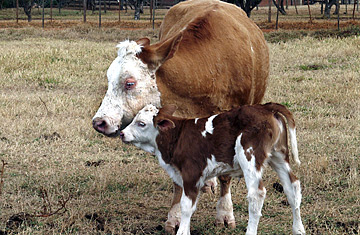
Gloria, right, the first calf born to a cloned cow, on a government farm in Brazil in 2004.
Are there any food products from cloned animals on the market?
No. In 2001, farmers and breeders voluntarily agreed not to sell any meat or milk from cloned animals to the public. They were willing to wait until the FDA could determine whether these foods were safe for human consumption, and wouldn't pose any health risks to people. This FDA report does not change that moratorium.
How are cloned animals made?
The most common method used is the same procedure that produced Dolly the sheep, the first mammal to be cloned. Scientists remove the DNA material from any cell in the animal they wish to clone (usually a skin cell) and place it into an egg that has had its own DNA removed. That egg is electrically and chemically activated to begin dividing, and after a few days in the Petri dish, it is transplanted into the womb of a surrogate until birth.
Why are cloned animals needed in agriculture?
Breeders are constantly looking to produce the highest-quality, highest-yield animals they can. Just as crop farmers create hybrid strains that can resist drought and disease, animal breeders want to target healthy animals that are good milk or meat producers. Cloning such elite stock is one way to maximize their yield.
Aren't cloned animals more prone to genetic defects and other abnormalities?
It's true that the cloning process itself is still inconsistent and expensive. On average, only about 2% to 5% of clones make it from egg to live birth. However, most of the genetic problems occur early in the cloning process, so that the few embryos that do successfully divide and mature turn out to be relatively normal. >
Will eating products from cloned animals pose health risks to people?
Probably not, according to the data the FDA analyzed. That's because even if the FDA eventually gives the go-ahead, meat or milk from the cloned animals themselves will likely not be what is for sale. Instead, breeders will almost certainly use cloned animals as they use prize bulls — they will mate them in the natural way, and it will be the offspring whose food products will end up on supermarket shelves. Based on studies of cloned cattle, pigs and goats born so far, any genetic defects generated by cloning seem to be limited to the clones themselves, and are not passed on when these animals mate naturally.
Will cloned products be labeled so I know that they came from a cloned animal?
The FDA is waiting until the comment period is over before making this decision. But Stephen Sundlof, director of the agency's Center for Veterinary Medicine, says: "If we felt that the food introduced substances that were harmful to people, labeling would be in order. But assuming that the draft risk assessment is not altered in content, which notes that the science shows that the food from these animals is not different materially from the food from other animals, we would not require labeling."
Which animals are being cloned?
For potentially commercial use, breeders are currently cloning cattle, pigs, goat and sheep. The FDA's report, however, addresses only the safety of food from cattle, pigs and goats, since there isn't enough information yet on products from cloned sheep.
Where can I go to post my comments about cloned meat and milk products?
Until April 2, the FDA welcomes public comment at https://www.accessdata.fda.gov/scripts/oc/dockets/comments/commentdocket.cfm?AGENCY=FDA
